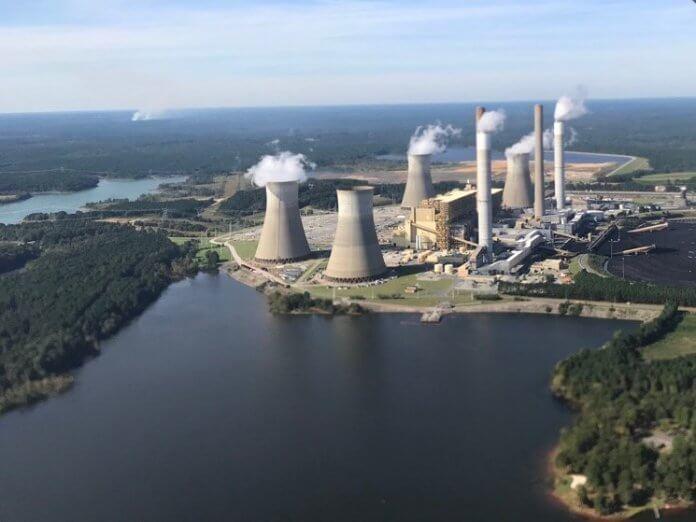
Caption
Plant Scherer in Juliette is one of the plants where Georgia Power plans to leave coal ash waste in unlined pits, where it sits in groundwater.
Credit: Photo contributed by Altamaha Riverkeeper

Plant Scherer in Juliette is one of the plants where Georgia Power plans to leave coal ash waste in unlined pits, where it sits in groundwater.
Several Georgia environmental organizations are pressing the U.S. Environmental Protection Agency to enforce national standards that would prevent Georgia Power from disposing of coal ash waste in a way that pollutes groundwater.
The Southern Environmental Law Center requested this week that the EPA revoke the Georgia Environmental Protection Division’s state coal ash residuals program that’s been used to approve Georgia Power’s cleanup plans for storing toxic waste left behind by power plants after decades of burning coal for energy.
The petition was filed Thursday on behalf of the Coosa River Basin Initiative, Altamaha Riverkeeper, Chattahoochee Riverkeeper, Georgia Interfaith Power and Light, the Sierra Club and others. The petition says that state and federal environmental officials are failing to protect nearby rivers, lakes, and streams and safeguard the state’s water supply.
Two months ago, environmentalists in Georgia cheered the EPA’s denying Alabama’s application for a state-run coal ash program, but since then frustration has grown over why the same rules that are being enforced in 49 states aren’t being followed in Georgia.
According to petitioners, Georgia Power plans to dump 33 million tons of toxic coal ash in unlined pits submerged in groundwater unless federal regulations are enforced. Georgia Power has retired most of the 11 coal-fired electricity generating plants that were scattered across the state in recent years, but the company plans to store the toxic waste from several others in ash ponds on the old sites.
“Despite years of discussions, Georgia EPD refuses to withdraw its Plant Hammond permit, while closures of much larger, more deeply submerged ash ponds are underway or completed at Plant Scherer in Juliette near Macon, Plant Yates near Newnan, and at Plant McDonough near Atlanta,” the letter says.
The federal Coal Ash Rule of 2015 required utilities to close or retrofit unlined ash ponds within six months if their levels of ash waste exceeded certain pollutant limits. A section of the 2015 rule allowed states to run their own coal ash disposal programs.
Georgia, Texas, and Oklahoma were given permission to run their own programs, but Georgia is now the only one in which state officials are ignoring the federal rules that prohibit sealing the waste in unlined pits where ash can contaminate groundwater, said Fletcher Sams, the executive director of the Altamaha Riverkeeper, which is opposing Georgia Power’s ash disposal plans at Plant Scherer in Juliette.
Alabama residents should not be better protected from coal ash toxins than Georgians, Sams said.
“The only state that is issuing illegal permits is the state of Georgia,” Sams said. “In my mind, whether it’s purposeful or not, the people of Juliette are being left out of this administration’s environmental justice priorities. They need action, not more empty promises.”
An EPA spokeswoman said that it is reviewing the petition in response to an emailed seeking comment Thursday from the Georgia Recorder.
Georgia EPD spokeswoman Sara Lips said that the state and federal agencies are having ongoing discussions about the latest developments on coal ash regulations and that the EPD’s program is committed to ensuring its program protects the public and environment.
Georgia Power spokesman John Kraft said the company intends to continue to make sure that its ash pond closures protect the environment and public.
Georgia’s state coal combustion residuals program was approved by EPA with oversight from Georgia EPD following a lengthy public comment and participation period, Kraft said.
“We know that EPD and EPA are continuing discussions on our permit applications, industry developments, and interpretations of the most recent rule,” Kraft said in an emailed statement. “We will continue to work with EPD to ensure closure plans across our facilities remain in compliance with state and federal rules.”
On June 28, the U.S. Court of Appeals in Washington, D.C., affirmed the EPA’s prohibition on closing coal ash dumps with ash sitting in groundwater. In addition, the EPA has been sued for denying an ash disposal permit extension at Ohio’s Gen. James Gavin Power Plant, whose operators argued the EPA was retroactively applying a new rule.
It’s time for federal intervention in Georgia since the state environmental protection agency continues to side with the fossil fuel industry, said Frank Holleman, senior attorney for the Southern Environmental Law Center.
“Georgia EPD has made it clear that it will not follow the law and protect Georgia’s clean water and communities from toxic coal ash pollution,” Holleman said in a statement. “EPA is charged with overseeing EPD’s program, and we need EPA to step in to protect Georgia’s rivers and neighborhoods, because EPD will not.”
This story comes to GPB through a reporting partnership with Georgia Recorder.